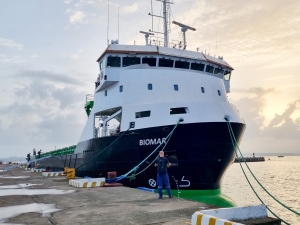


(Posted on 11/08/25)
Amid increasing pressure on shipping to achieve the IMO 2050 decarbonisation targets, the Responsible Shipping Initiative (RSI) and DNV have completed a new study: "Decarbonistion of the short sea dry bulk fleet", co-funded by the Swedish Transport Administration. The study finds that while Swedish cargo owners and charterers are committed to greener practices, a lack of regulatory and economic incentives for smaller tonnage is hindering their progress.
Europe’s short sea general cargo fleet is ageing rapidly, with many vessels nearing the end of their operational life and few replacements on order. Most of these ships fall below the 5000 GT compliance threshold for international and EU emissions regulations, which means that shipowners often have litte incentive to invest in lower-emission vessels in line with decarbonization trajectories. As a result, cargo owners who rely on these vessels, including RSI members EFO AB, Lantmännen, SSAB, Stockholm Exergi and Södra, face a strategic challenge: how to secure future transport capacity that helps them meet their climate goals.
Sebastian Tamm, Chairman of RSI and Manager Logistics Development at EFO, said: “Through RSI, we’ve long promoted responsible shipping, focusing on working conditions, health, and safety. During the COVID lockdown, we shifted our focus to decarbonization. However, our typical short-term Contracts of Affreightment limit shipowners' ability to invest in radically different vessels. This study highlights the need to turn long-term decarbonization goals into actionable short-term targets for contracting. This will help with planning, investment, and compliance with new regulations. We appreciate DNV’s insights and support in developing this study with us.”
The project was divided into three work packages (WP). WP1 established emissions baselines for each RSI member using automatic identification system (AIS)-based modeling, due to the lack of primary emissions data. This helped identify key trades for green fleet renewal based on transported volumes and emissions. WP2 examined the costs of introducing green ships and calculated the “green premium” for vessels powered by e-methanol compared to marine gas oil (MGO). Measures such as government support and improved transport efficiency were evaluated to reduce costs and workshops were held with shipowners and fuel providers. WP3 used a fleet renewal model to assess the pace of renewal required to meet climate targets, comparing this with alternative strategies such as biofuel blending and operational efficiency improvements.
Hannes von Knorring, Principal Consultant and Global Cargo Owner Segment Lead at DNV Maritime, said: “A major challenge in adopting low-emission fuels is the uncertainty shipowners face around long term costs and market demands. Cargo owners may also lack insights into fuel options and their impact on supply chain emissions. While the smaller vessels used by RSI members are not yet regulated they must report from this year on emissions to the EU, making it easier for cargo owners to collect data and set actionable targets. Through this project, RSI's mission is to share knowledge, set standards, and find common ground for future shipping needs, and we are pleased to support their efforts.”
Leading vessel performance platform Smart Ship Hub says the industry should expect a breakthrough year... Read more
The Nordic countries are taking an important step towards decarbonising maritime transport with the... Read more
Germany’s Steelpaint has appointed ADD Marine as its representative for Greece and Cyprus, strengthening... Read more
Rio Tinto’s first Pilbara-made iron ore rail car has rolled off the production line in Karratha... Read more
Precision meets progress at Phu My Port, Vietnam. The LPS 550 has been deployed to handle bulk commodities... Read more
bound4blue, a global leader in wind propulsion systems, has expanded its industrial footprint in Asia... Read more
As the industry explores multiple decarbonisation pathways, methanol is gaining attention as a practical... Read more
Technology group Wärtsilä will supply an integrated hybrid propulsion system for a bulk carrier... Read more
Superior Industries, Inc., a US-based manufacturer and global supplier of bulk material processing and... Read more
ESL Shipping has taken a significant step forward in digitalisation by deploying a new multichannel... Read more